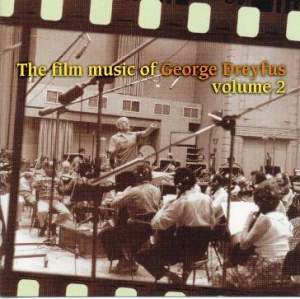Compilation:
The film Music of George DREYFUS Vol. 2 A Descant for Gossips Tender Mercies, Outbreak of Love, Waterfront, Power without Glory, Great Expectations, Rush
MOVE MD 3238 [79:47]

It is unusual for Film Music on the Web to receive CDs of Australian music to review so this album is most welcome. It comprises music written for one American film Tender Mercies and for Australian Broadcasting Corporation dramas and mini-series.
George Dreyfus's music for A Descant for Gossips is an enchanting score: tender, sometimes sprightly but always sensitive for the tragic story of an innocent 13-year-old girl caught up in the forbidden romance of a favourite teacher. Another lovely score this time set in the wide-open spaces of Texas, was for the Oscar winning Tender Mercies (for Robert Duvall). This album contains Dreyfus's colourful evocative music for the Texas landscapes that was omitted from the finished print. As the notes suggest you can now play it with the video or DVD release to judge its affect.
The Main Theme for Outbreak of Love has a waltz theme that is constantly interrupted with quirky woodwind figures, solo fiddle material and quasi-military fanfare figures. This richness of scoring is apparent in the very Australian-inflected Waterfront score: quirky, capricious, rowdy and brassy. The story line has conflict between bosses and unions and the music straddles many styles German passacaglia, American vaudeville, sour union lament, Italian songs and a non-too-romantic theme for the film's heroine (Greta Scacchi). Power Without Glory 'The Death of John West' a powerful political manipulator, has the intensity and poignancy of the sort of scores one associates with Max Steiner and Franz Waxman.
The Aussie's view of Dicken's Great Expectations was somewhat unorthodox for it chose to concentrate on the escape and life of the convict Magwitch in Australia and how he came to make the young Pip, growing up in England, his ward. Dreyfus dresses the folk tune, 'I gave my love an apple' in variations that are sombre, plaintive, pastoral and in waltz time. 'Bold Jack Donohue' swaggers slowly, then with increasing tempi passes through cantering to galloping rhythms as snare drums repeat the theme adding colour and excitement. 'Spring Song' is a pleasant pastoral evocation before the peaceful surface is ruffled with sinister figures and chase/fugitive-like figures. 'Bridget's Theme' is another well-rounded character study, comic yet poignant and vulnerable. 'Good fortune' has a ring of Hollywood's musical idea of nineteenth-century comfort and well-being. More interesting is the cheerful, cheeky outdoor brass band music for 'Villains'.
The album closes with a lively mini concerto featuring the popular flautist, James Galway in music from Rush based on an Australian folk ballad, 'The Old Pamer Song'.
An interesting selection of melodious music. There is however a quirkiness that might not travel well outside Australia and the recorded sound is often uncomfortably shrill.
Ian Lace

Return to Index